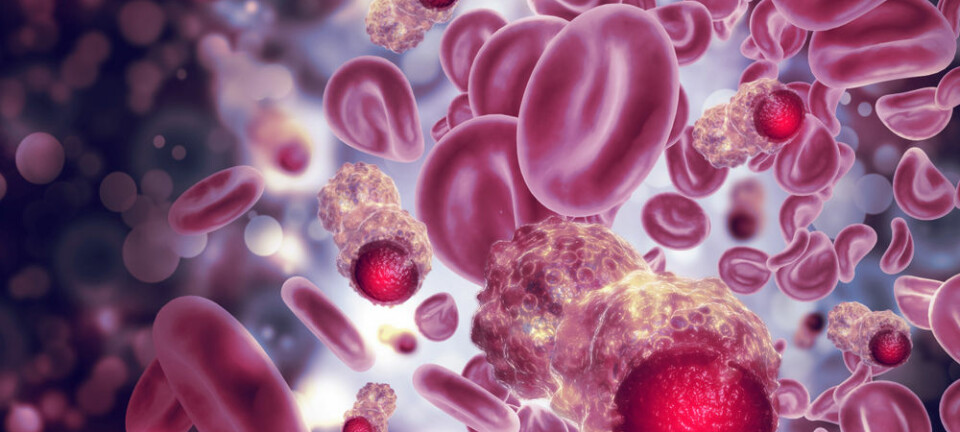
Your risk of a deadly cancer is linked to your blood type
People with different blood types have different risks of developing pancreatic cancer, Norwegian research shows.
Pancreatic cancer is one of the most deadly cancers a person can get. Roughly 95 per cent of those diagnosed with the disease will die of it, some within months of their diagnosis. In Norway, pancreatic cancer kills more than 700 people a year.
One of the problems with pancreatic cancer is that it can be difficult to diagnose during its early stages. When it is finally discovered, it is almost always at an advanced stage and has spread.
Now, Norwegian researchers have learned more about how the pancreas works, which might help them gain a better understanding of what sets the stage for this dangerous form of cancer. This information might also help researchers figure out better ways to fight the disease.
Different blood type - different risk
PhD candidate Khadija El Jellas and his colleagues at Haukeland University Hospital compared blood types in people from western Norway who had pancreatic cancer with two different groups of people from the same region.
The results showed that there appears to be a correlation between a person’s blood type and the risk of the disease.
“We found that people who have blood type A have a slightly increased risk, while those with blood type 0 are slightly more protected than the average,” says Anders Molven, a professor at the University of Bergen who is head of the research group at Haukeland.
This is consistent with previous studies of populations in other countries.
Molven emphasizes, however, that these differences in risk are quite small. People with blood type O can still get pancreatic cancer, and the risk of getting this type of cancer is still small for people with blood type A.
Nevertheless, this connection may open the door on what lies behind this frightening disease.
May affect the intestinal flora
It seems reasonable that your blood type might affect your risk of blood cancer, but links between blood type and pancreatic cancer could seem a little more farfetched.
But the researchers think one explanation may be related to a person’s intestinal bacteria.
Different blood types mean that one person’s blood cells are not exactly the same as another person’s. In addition to having differences in the proteins in the blood cells, different blood types have different sugar molecules in the blood.
People with blood types A and B have an extra sugar molecule in their blood compared to people with blood type O. This is why doctors match blood types when they do blood transfusions.
If a person with type O blood receives type A blood, their immune system perceives the sugar molecules as foreign and mounts a strong immune response.
However, subsequent research has shown that these particular sugar molecules are also found on certain cells in the intestine. As a result, different kinds of intestinal bacteria attach to different degrees on intestinal cells containing A, B or O molecules.
“There is pretty good evidence that different blood types can cause differences in a person’s intestinal flora. It is also known that the intestinal flora can affect some types of cancer. It’s possible to imagine that a blood type changes the intestinal flora, which in turn affects the risk of pancreatic cancer,” Molven says.
Blame the immune system
Another hypothesis concerns the immune system itself.
Our immune systems are important in the body's ability to fight cancer.
Molven says that cancer cells often change molecules that are found on the surface of the cell. And sometimes they may be changed to resemble the sugar molecules found on blood cells, for example A.
In that case, the immune system of a human with blood type A will not perceive the cancer cell as foreign. On the other hand, the immune system of someone with type O blood would recognize the cancer cells as foreign and would fight them.
Affects digestive enzymes
“We have also studied one of the digestive enzymes that are produced and excreted in the pancreas,” Molven explains.
It turned out that this enzyme also had sugar molecules on its surface that were associated with blood type.
“There is thus a common pancreatic enzyme that is modified according to the blood type. Now we wonder if this has anything to do with the risk of cancer,” he said.
Perhaps this enzyme affects cancer risk by influencing intestinal flora? Molven believes the findings regarding the enzyme may be compatible with the hypothesis related to the intestinal flora and the immune system. Perhaps even both at the same time.
Even though these hypotheses are unproven, Professor Caroline Verbeke at the University of Oslo is optimistic. She is head of Pancreatic Cancer Network Norway, which works for better treatment of pancreatic cancer.
“These results are interesting because they link things that we haven’t seen in this context before,” she said. “First and foremost, it is important to know more about the risk factors for pancreatic cancer. Most people can't do anything about their risk, like genes. But if your risk is also affected by microorganisms in the digestive system, it may be possible to influence them.”
----------
Read the Norwegian version of this article at forskning.no
































